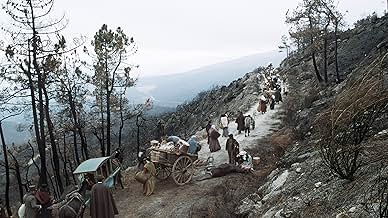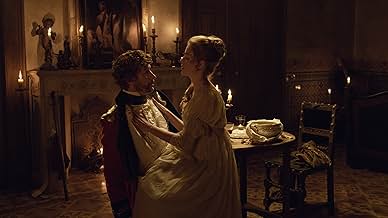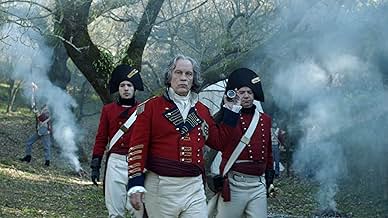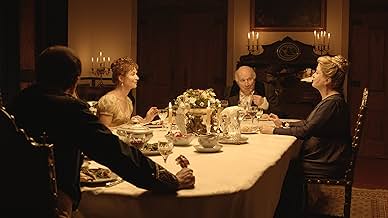IMDb-BEWERTUNG
6,0/10
1665
IHRE BEWERTUNG
Füge eine Handlung in deiner Sprache hinzuAn Anglo-Portuguese army led by General Wellington retreats to the fortified lines of Torres Vendras after a battle with Napoleon Bonaparte's army in 1810.An Anglo-Portuguese army led by General Wellington retreats to the fortified lines of Torres Vendras after a battle with Napoleon Bonaparte's army in 1810.An Anglo-Portuguese army led by General Wellington retreats to the fortified lines of Torres Vendras after a battle with Napoleon Bonaparte's army in 1810.
- Auszeichnungen
- 9 Gewinne & 18 Nominierungen insgesamt
Empfohlene Bewertungen
"As Linhas de Wellington" is a war drama made, in co-production, by Portugal and France, and portrays the final phase of the French Invasions in Portugal. Defeated in the Battle of Bussaco, the soldiers of the French general Massena continue towards Lisbon, forcing the Anglo-Portuguese armies to retreat to the Lines of Torres Vedras, a massive set of artillery fortifications and entrenched paths designed not to let the invader pass, and also, protect a possible British withdrawal from the country. Without means and weapons to force the passage, Massena will come to give up the invasion, retreating to Spain, months later, always chased by British soldiers.
Well, I tend to be a little pessimistic about Portuguese cinema, but considering the big budget of the film and the big names involved in the cast I decided to give it a try. And, I confess, I was impressed by the quality of the final product, much higher than normal for Portuguese cinema.
Let's first talk about the technical details of the film, which I think is one of its strongest points. In fact, it is rare for a film in Portugal to have such good production values. Here we have an excellent photograph, impeccable scenery, excellent costumes and makeup, faithful to the period portrayed, a good job of filming and editing and also a very good soundtrack, which is in your ear. It is perfectly possible to see where so much money has been spent, and well spent. I think the film is a little dark, in that gray is a very present color in photography, but I think it combined well with the plot and ambience of the film.
Another point where the film exceeded my expectations was the cast and their work. The most resonant name is that of John Malkovich, an actor twice nominated for Oscar, well known in Hollywood and who has resided in Portugal for some years. Being the cast's most resonant name, it should have a presence and protagonism in the plot ... but the script is limited to showing Wellington discussing with his painter, in philosophical ramblings about a steak or in moments of meditation, with lighted candles. It is manifestly little work for an actor like Malkovich, which can be a nonsense, depending on the money he earned from the film. Not to mention that, unlike Malkovich, Wellington was younger and had short hair. Also other big names, like Isabelle Huppert, Melvil Poupaud, Catherine Deneuve and her daughter, Chiara Mastroianni, only appear in cameo. That is, the great actors who could boost the film with their talent and give the Portuguese cast something to learn are rarely used, they just appear and help the film to sell. That is, to say the least, stupid.
The real cast, which really appears and represents, is composed of a hard core where we see good Portuguese actors like Nuno Lopes (a sergeant from a Portuguese Battalion of Hunters), Marisa Paredes (a Spanish widow), Carloto Cotta (a Portuguese officer) , Victoria Guerra (a fiery Englishman), Marcello Urgeghe (a British officer), Jemima West (the bride of an English officer who dies in the conflict), Miguel Borges (a usurer merchant), Filipe Vargas (an aristocrat in search of his missing wife ), Adriano Luz (a Portuguese poet, initially at the side of the French, who disappoints and deserts to fight on the Portuguese side) Elsa Zylberstein (a nun), Albano Jerónimo (a priest who takes up arms against the French), Joana de Verona (a woman struggling to avenge her son's death and the abuses she suffered), Gonçalo Waddington (a spy), Maria João Bastos (the aristocrat's wife) and Paulo Pires (a military officer). Everyone was reasonably well, but Nuno Lopes, Jemima West, Adriano Luz and Albano Jerónimo deserve special congratulations for their good work. I would also highlight Joana de Verona, to whom the film reserves one of the most suffered and dramatic characters. Victoria Guerra also does a good job and has an excellent English accent, but the scenes where she appears naked are expendable and could have been cut, had it not been for the bad Portuguese habit of involving sex in everything.
Anyone who expects to see a war film, or a historical film, will certainly be disappointed. The historical personages are limited to appearing fleetingly, the historical facts are portrayed, but the film is not about them. We hardly see a fight scene, with the exception of a few skirmishes. It is a film about ordinary people, whom the war deeply affects, and about their personal dramas. Seen in this light, it is a competent film, which has more quality than the garbage that Portuguese cinema usually presents. But it is far from perfect and there is an underuse of notable actors that is not understood, except for possible issues related to the fee to be paid.
Well, I tend to be a little pessimistic about Portuguese cinema, but considering the big budget of the film and the big names involved in the cast I decided to give it a try. And, I confess, I was impressed by the quality of the final product, much higher than normal for Portuguese cinema.
Let's first talk about the technical details of the film, which I think is one of its strongest points. In fact, it is rare for a film in Portugal to have such good production values. Here we have an excellent photograph, impeccable scenery, excellent costumes and makeup, faithful to the period portrayed, a good job of filming and editing and also a very good soundtrack, which is in your ear. It is perfectly possible to see where so much money has been spent, and well spent. I think the film is a little dark, in that gray is a very present color in photography, but I think it combined well with the plot and ambience of the film.
Another point where the film exceeded my expectations was the cast and their work. The most resonant name is that of John Malkovich, an actor twice nominated for Oscar, well known in Hollywood and who has resided in Portugal for some years. Being the cast's most resonant name, it should have a presence and protagonism in the plot ... but the script is limited to showing Wellington discussing with his painter, in philosophical ramblings about a steak or in moments of meditation, with lighted candles. It is manifestly little work for an actor like Malkovich, which can be a nonsense, depending on the money he earned from the film. Not to mention that, unlike Malkovich, Wellington was younger and had short hair. Also other big names, like Isabelle Huppert, Melvil Poupaud, Catherine Deneuve and her daughter, Chiara Mastroianni, only appear in cameo. That is, the great actors who could boost the film with their talent and give the Portuguese cast something to learn are rarely used, they just appear and help the film to sell. That is, to say the least, stupid.
The real cast, which really appears and represents, is composed of a hard core where we see good Portuguese actors like Nuno Lopes (a sergeant from a Portuguese Battalion of Hunters), Marisa Paredes (a Spanish widow), Carloto Cotta (a Portuguese officer) , Victoria Guerra (a fiery Englishman), Marcello Urgeghe (a British officer), Jemima West (the bride of an English officer who dies in the conflict), Miguel Borges (a usurer merchant), Filipe Vargas (an aristocrat in search of his missing wife ), Adriano Luz (a Portuguese poet, initially at the side of the French, who disappoints and deserts to fight on the Portuguese side) Elsa Zylberstein (a nun), Albano Jerónimo (a priest who takes up arms against the French), Joana de Verona (a woman struggling to avenge her son's death and the abuses she suffered), Gonçalo Waddington (a spy), Maria João Bastos (the aristocrat's wife) and Paulo Pires (a military officer). Everyone was reasonably well, but Nuno Lopes, Jemima West, Adriano Luz and Albano Jerónimo deserve special congratulations for their good work. I would also highlight Joana de Verona, to whom the film reserves one of the most suffered and dramatic characters. Victoria Guerra also does a good job and has an excellent English accent, but the scenes where she appears naked are expendable and could have been cut, had it not been for the bad Portuguese habit of involving sex in everything.
Anyone who expects to see a war film, or a historical film, will certainly be disappointed. The historical personages are limited to appearing fleetingly, the historical facts are portrayed, but the film is not about them. We hardly see a fight scene, with the exception of a few skirmishes. It is a film about ordinary people, whom the war deeply affects, and about their personal dramas. Seen in this light, it is a competent film, which has more quality than the garbage that Portuguese cinema usually presents. But it is far from perfect and there is an underuse of notable actors that is not understood, except for possible issues related to the fee to be paid.
If you think about the French Invasions of the 19th Century, you think about a time of war, tragedy, heroism, violence and excesses. It is the perfect plot for an epic movie. Unfortunately, in the case of "Linhas de Wellington", the movie is Portuguese. Don't get me wrong, I am Portuguese too. What I mean is that we, as a nation, have a very hard time dealing with our own heritage and heroes. I don't know, perhaps deep inside each of us knows how short we fell of living up to our forefathers extraordinary legacy. Anyway, regardless of the reason why, the fact is that we do not give enough praise to the best among us, and that reflects on our modern art in general and in this movie in particular. That being said, instead of all the drama, heroism and war, this movie shows the story of simple people, ordinary anonymous folks, leaving their land as the French Army advances. Unfortunately, there are too many characters, not shown long enough for the viewer too actually identify himself with any of them. That turns the movie into a tale about people you don't really care for. As for the Duque of Wellington, the way he is portrayed is nothing short of revolting... As you would expect from a Portuguese movie because of all I said above. As a conclusion, "Linhas de Wellington" is a big disappointment. It is watchable, but nothing more than that.
Had everything to work...good cast, beautiful landscapes, and a very good story...
Unfortunately, there's no movie director in this god forsaken country, that knows what "action"means...to do a movie like this, without any battle scenes, in absurd, at least...
So, don't bother... it's very very boring...
In 1810 Napoleon sent Marshal Massena (who was famous then and called "the dear son of the victories" I think that by Napoleon himself) to invade Portugal for the third time (French army had been defeated there twice before). The Franch army now entered the center of the country and marched to the south with relative facility despite having been beaten at Buçaco by the Anglo-Portuguese troops who began to withdraw to the south till they reached the Lines of Torres Vedras a huge mass of fortifications built in secret by Wellington in the previous one and half year behind which they entrenched themselves always under Wellington command. The French army after being before the Lines for some time realized they were unconquerable and retreated for good. This movie is about that but who is hoping to see a historical movie may be somewhat disappointed because though the story develops itself having that war as a background it is much more about the personal adventures and misadventures of its characters not only the main ones but some minor ones too. It is very good from the technical standpoint I mean the scenes, camera movements, sequences, angles of view, framings and visual details are very good indeed. The acting is also excellent with a luxury cast with such actors like John Malkovich (as Wellington)and the Portuguese Nuno Lopes. The reproduction of the epoch atmosphere in sceneries and costumes is also excellent. The main flaw that can be appointed to this movie is that the story somehow lacks a thread, losing itself among scattered and diverse episodes although very well shown and developed. And in terms of social usages (certain love scenes for instance) and language employed there is some inadequacy to early 19th century seeming much more as belonging to our contemporary meanings and values.
A superb piece of Portugal cinema. Somewhat slow, however, if you love history you will be enthralled.
Wusstest du schon
- WissenswertesDirector Raúl Ruiz died in August 2011 during preproduction. Producer Paulo Branco offered the job of directing to actor John Malkovich, but Malkovich felt he wouldn't be able to do justice to Ruiz's vision, recommending instead Ruiz's widow and long-time collaborator, Valeria Sarmiento.
- VerbindungenEdited from As Linhas de Torres Vedras (2012)
Top-Auswahl
Melde dich zum Bewerten an und greife auf die Watchlist für personalisierte Empfehlungen zu.
- How long is Lines of Wellington?Powered by Alexa
Details
- Erscheinungsdatum
- Herkunftsländer
- Offizielle Standorte
- Sprachen
- Auch bekannt als
- Lines of Wellington
- Drehorte
- Produktionsfirmen
- Weitere beteiligte Unternehmen bei IMDbPro anzeigen
Box Office
- Budget
- 4.800.000 € (geschätzt)
- Laufzeit
- 2 Std. 31 Min.(151 min)
- Farbe
- Seitenverhältnis
- 2.35 : 1
Zu dieser Seite beitragen
Bearbeitung vorschlagen oder fehlenden Inhalt hinzufügen
























